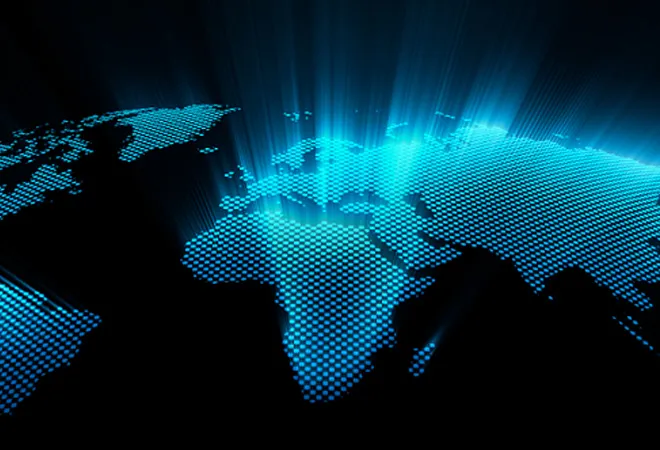
A fashionable trend in the last decade has been a surge in digital innovations and mobile phone ownership across developing nations, particularly in sub-Saharan African (SSA) countries and India. Increasingly, countries are looking towards digital solutions and innovations to spur productivity and drive development. But, as a continent, Africa is yet to reach the same levels of digital maturity of other regions of the world in terms of digital penetration, usage, and capabilities. Africa still remains far behind much of the world in terms of its digital infrastructure. However, it is useful to acknowledge that despite being bound by geographical divisions, digital and emerging technologies can play a critical role in unifying the continent.
Today, the African continent represents a fertile territory to drive innovation that seeks to tackle some of the continent’s pressing needs and develop some commercially viable opportunities. Across the continent, there has already been a growing spread of sensors, networks, Artificial Intelligence, and automation. Owing to this, several emerging technologies are proliferating, such as drones, CCTV cameras with facial recognition, smart cities, etc. Drones are supplying lifesaving medical supplies in remote locations as we have seen in the case of
Zipline.
The African continent represents a fertile territory to drive innovation that seeks to tackle some of the continent’s pressing needs and develop some commercially viable opportunities.
In terms of internet penetration in Africa, countries like Morocco, Seychelles, Egypt, Kenya, and Tanzania boast impressive internet penetration levels. Countries like South Africa and Nigeria have a modest level of internet access, while countries like Mali, Mozambique, Democratic Republic of Congo, Niger, and Chad, have less than . Mobile phones are a primary platform for internet access and allows users to conduct e-commerce. But while most people across SSA own mobile phones, smartphone adoption has
remained small in the region.
Currently, only one quarter of Africa’s population has internet access, but it is hoped that by 2030, Africa will have achieved a rough parity with the rest of the world when
three quarter of Africans will be projected to get access to the internet. There is also
evidence to suggest that the African countries that have successfully fought off diseases such as Ebola through tracing, tracking, and treating, have relied on access to technologies. Therefore, a tech-enabled and digitised Africa is essential to fight health pandemics and ensure that vulnerable people and communities are identified and traced.
While African governments need to place emphasis and prioritise designing policies that increase internet connectivity, there should also be an equal emphasis on affordability, equitable access, and cyber security. Despite growing broadband internet coverage,
buying mobile data is an expensive affair in many African countries. For example, in Sao Tome and Principe, 1GB of mobile data costs US $29, while in Botswana, it costs around US $16. The same is true for other countries like Togo and Namibia, among others. Such expensive data packs hinder the prospects of economic growth and job creation.
Where does India come into the picture?
Both India and African countries have faced similar challenges to digital transformation i.e., low internet connectivity, the digital divide, and a skills mismatch. However, the continent’s digital empowerment and economic prosperity stands to benefit from India’s rapidly developing digital economy. There is enormous potential for
Africa to learn from India’s digital revolution under the framework of South-South Cooperation.
While African governments need to place emphasis and prioritise designing policies that increase internet connectivity, there should also be an equal emphasis on affordability, equitable access, and cyber security.
In recent years, India has successfully launched several initiatives aimed at digital transformation, since having a digital identity is the very basis of functioning in a digital economy. India launched the world’s largest digital identification programme—
Aadhar—which literally means foundation. The Aadhar system has already enrolled over 1 billion Indians and uses cloud technology which allocates a unique 12-digit identification number based on their biometric information and demographics. This has enabled the Indian government to link individuals’ banking transactions, utility bills, phone numbers, and physical addresses.
A comparable example from Africa is the ‘
Ghana Card’, which also delivers public services but at the moment, their enrolment and distribution remains limited. Printing centres are limited. But there are ample opportunities for the Ghana Card to learn from India’s Aadhar on the usage of cloud technology for data management since these generate huge amounts of data. But unlike the Aadhar card, the Ghana Card is used as a national identity and confers citizenship on its holders.
Other prominent examples in Africa are Kenya’s ‘
M-Pesa’, whose service is now available to over 51 million people across seven African countries. Another is Nigeria’s ‘
Jumia group’, which was founded by Rocket Internet in 2012 and is one of Africa’s best funded e-commerce start-ups. This has created a network of motorbikes and trucks that deliver products to customers.
India has also launched other unique digital initiatives aimed at digital transformation like ‘
Digital India’, which has brought internet connectivity to a number of gram panchayats in rural India by laying optical fibres across the country.
Back in 2015, India also set up a which provided a broad framework of skills-related activities. One of its key aims was to provide technical and vocational educational training by offering diploma courses. Other initiatives include BharatNet, Pradhan Mantri Jan Dhan Yojana, IndiaStack, among others. If such Indian initiatives can be replicated and implemented properly in African countries, it can help bridge Africa’s digital gap and enable young Africans to become more employable. Although India is keen to share its knowledge and business know-how with African countries, they should look to produce more IT skilled individuals who can learn from Indian counterparts and apply it, based on local requirements.
The Indian government is providing over 4000 free tele education courses over the next five years and continuing medical examinations to over 1000 African doctors, nurses, and para-medical staff each year.
The most successful example of India-Africa digital tech cooperation has been the
Pan African e-Network Project (PAeNP) that was operational in 48 African countries. It provided seamless and integrated satellite, fibre optics, and wireless network to connect African countries to various Indian super speciality hospitals and premier educational institutes. This project has now been extended from 2018 onwards and is known as the
e-VidyaBharati and e-AarogyaBharati (e-VBAB) project on telemedicine and tele education. As part of this project, the Indian government is providing over 4000 free tele education courses over the next five years and continuing medical examinations to over 1000 African doctors, nurses, and para-medical staff each year. Indian doctors also provide free medical consultancy to African doctors. This project is popularly held as a digital bridge of knowledge and health between India and Africa.
Both Africa and India also share a long history of coordinating views and efforts in institutions of global governance like the World Trade Organisation (WTO), International Monetary Fund, and World Bank. Democratic reforms in global institutions are essential, which is why India continues to
strongly demand and advocate tangible action for United Nations Security Council reforms in line with the Common African Position and Ezulwini Consensus.
Back in 2018, on the issue of moratorium on custom duties on electronic transmissions, which can reduce competitiveness in developing countries, since they have higher tariffs on physical products. The same product in digital form attracts zero duty. Subsequently, both have continuously warned that attempts by developed countries to frame rules on ecommerce outside the WTO framework will undermine the consensus principle.
The same happened recently when developed countries rejected India and South Africa’s joint
proposal to temporarily suspend Intellectual Property Rights rules related to the manufacturing and import of COVID-19 vaccines in developing countries.
Both Africa and India also share a long history of coordinating views and efforts in institutions of global governance like the World Trade Organisation (WTO), International Monetary Fund, and World Bank.
Digital empowerment has emerged as a crucial component of the India-Africa partnership and development compact. Over the years, Indian private companies have made investments in modern technologies to support African countries’ growth through various measures, including grants and lines of credit. In
Kenya and
Botswana, India has invested in IT education. Countries like Ghana, Tanzania, and Uganda have received
high-end computers. India has also assisted in setting up the
Ghana-India Kofi Annan Centre of Excellence in Information and Communications Technology in Accra, and has an agreement to
set up a similar IT centre in Ethiopia. Such examples showcase India’s willingness and capacity to contribute towards Africa’s digital revolution.
Being a large federal democracy, India’s own experience with digital transformation serves as a more relatable model to understand the challenges faced by African countries than other Asian or Western counterparts. As the world is poised to embrace more digital innovations, India has a golden opportunity to showcase its willingness and capacity to contribute towards Africa’s digital revolution.
The views expressed above belong to the author(s). ORF research and analyses now available on Telegram! Click here to access our curated content — blogs, longforms and interviews.



 A fashionable trend in the last decade has been a surge in digital innovations and mobile phone ownership across developing nations, particularly in sub-Saharan African (SSA) countries and India. Increasingly, countries are looking towards digital solutions and innovations to spur productivity and drive development. But, as a continent, Africa is yet to reach the same levels of digital maturity of other regions of the world in terms of digital penetration, usage, and capabilities. Africa still remains far behind much of the world in terms of its digital infrastructure. However, it is useful to acknowledge that despite being bound by geographical divisions, digital and emerging technologies can play a critical role in unifying the continent.
Today, the African continent represents a fertile territory to drive innovation that seeks to tackle some of the continent’s pressing needs and develop some commercially viable opportunities. Across the continent, there has already been a growing spread of sensors, networks, Artificial Intelligence, and automation. Owing to this, several emerging technologies are proliferating, such as drones, CCTV cameras with facial recognition, smart cities, etc. Drones are supplying lifesaving medical supplies in remote locations as we have seen in the case of
A fashionable trend in the last decade has been a surge in digital innovations and mobile phone ownership across developing nations, particularly in sub-Saharan African (SSA) countries and India. Increasingly, countries are looking towards digital solutions and innovations to spur productivity and drive development. But, as a continent, Africa is yet to reach the same levels of digital maturity of other regions of the world in terms of digital penetration, usage, and capabilities. Africa still remains far behind much of the world in terms of its digital infrastructure. However, it is useful to acknowledge that despite being bound by geographical divisions, digital and emerging technologies can play a critical role in unifying the continent.
Today, the African continent represents a fertile territory to drive innovation that seeks to tackle some of the continent’s pressing needs and develop some commercially viable opportunities. Across the continent, there has already been a growing spread of sensors, networks, Artificial Intelligence, and automation. Owing to this, several emerging technologies are proliferating, such as drones, CCTV cameras with facial recognition, smart cities, etc. Drones are supplying lifesaving medical supplies in remote locations as we have seen in the case of  PREV
PREV


